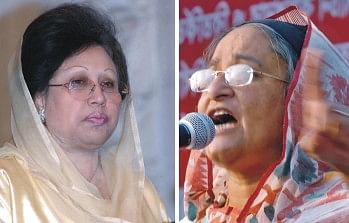Political professionalism and ethics
Badrul Islam, Uttara, Dhaka
Bangladeshis heaved a sigh of relief when the Leader of the Opposition joined the Parliament after a long absence (from September 15, 2004) and the ruling party cordially welcomed her. In her speech, Sheikh Hasina on behalf of AL and 14 party Alliance placed "Reform proposals for fair polls". The BNP Secretary General responded that the Government was also ready to discuss ways to make future elections more credible, free and fair. We all should indeed feel proud of this positive outcome. This brings the political position from confrontation to the level of "Deuce," as they say in tennis. From this point onwards only the most skillful player(s) wins the game; likewise, between the AL and BNP, the skillful deliberator, within the Parliament, will be the winner."The Reform proposals for fair polls" are categorised as follows: Five relate to the Care Taker Government, 15, to making an independent Election Commission and 11 to electoral laws. That's a total of 31 proposals which Hasina said, "are to establish the people's right to vote, not to go to power." Khaleda Zia too, on several occasions, has confirmed that proposals for reforms placed in the Parliament will be negotiated to ensure "rights of the voters and a free and fair elections." Now the citizens are eagerly awaiting the results. As reported in newspapers, amid huge desk thumping by party deputies, the AL chief said," People want a change and for the change a free and fair election is a must." Does this phrase sound familiar? Of course it does. The media had orgainsed many roundtable conferences; additionally, civil societies, human rights activists, legal and professional associations, all, organised seminars and discussions for creating mass awareness for all voters and the political parties to understand this hard truth, "People want a change". The Nation feels proud and honoured that their efforts have finally been proved to be productive. Hasina should have added three more proposals: One, appointment of non-partisan Speakers. Two, deleting Article 70, and three, women's right to participate in direct elections. These are the main hindrances in the smooth running of the parliament and democracy. The Government and the opposition leaders, as elected representatives, owe it to the citizens and therefore it's imperative that they jointly devise a strategy to solve the problems that hinders the establishment of democracy.
|

Photos: AFP |